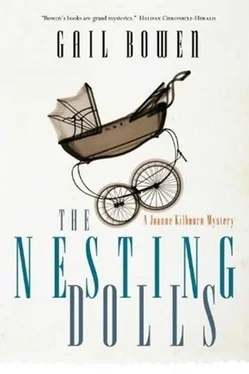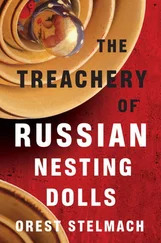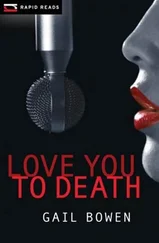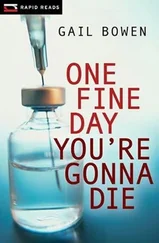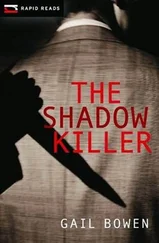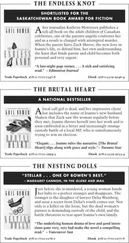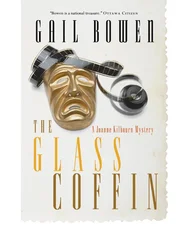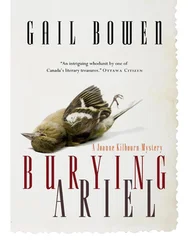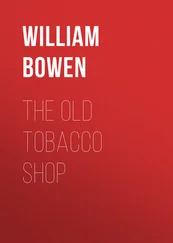“We saw your husband in action this morning,” she said. “We get gloomy staying in the apartment, so we put on our boots and tromped through the snow to the courthouse. Mr. Shreve puts on quite a show.”
Theo was just about to pop another lemon tart in his mouth, but our conversation had captured his interest.
“The one in the chair?” he asked me.
“He’s my husband,” I said.
Theo’s brown eyes were suddenly bright and shrewd – as if the veil had been lifted. “His argument was smart but not sound,” he said.
“Lots of snap and dazzle, but no substance?” I said.
Theo stared at me without comprehension. The veil had dropped again.
“I disagree,” Myra said, knitting the ragged pieces of our discussion into a coherent whole. “Not with Joanne’s answer, but with your assessment, Theo. In my opinion, Mr. Shreve is right. No otherwise blameless person should have to pay for a moment of indiscretion with a lifetime of penance.”
“So say you,” Theo said, and he went back to his plate.
We moved to safer subjects: the changes that had taken place in the city in the past three decades; the effect sudden prosperity was having on the province; some interesting small galleries Myra and Theo might enjoy. Myra was a quick and intelligent conversationalist, but her slip on the ice had taken its toll, and she was flagging.
When Theo yawned, Myra stood quickly. The party was over, but she was gracious. “Joanne, I haven’t given you a tour of the apartment.” She had already begun to move, and I followed. The small kitchen was separated from the living room by a counter on which there were two martini glasses: the first held red jelly beans; the second, green. “That’s a nice festive touch,” I said.
“There were three,” Theo volunteered, “but she broke one.”
“Joanne doesn’t need to hear about our domestic mishaps, Theo,” Myra said sharply. “We’ll get another.” She turned to me. “My husband has a sweet tooth,” she said.
I smiled. “So does mine, but he’d regard using his martini glasses for anything other than gin as sacrilege.”
“I’ll remember that when we entertain you,” Myra said. “Now here’s the master bedroom – sleek, no? I’m still getting accustomed to the new look of our lives. I decided it would be better to look forward, not back. Except for our clothing and Theo’s papers, we didn’t bring a thing with us from Ottawa. A fresh start was best. All my collections were… dispersed.”
“It must have been difficult leaving all that behind,” I said.
“It was a small death,” she said flatly. “Now here’s the bathroom – also sleek and soul-less. And,” she said, moving down the hall, “here’s my little warren.” She gestured to a study with a cranberry-coloured reading chair, stacks of novels with glossy dust jackets, and six framed black-and-white photos arranged in rows of three on the wall. The photographs in the top row were of a woman’s foot, its toes gnarled by arthritis, a graceful, liver-spotted hand, and a drooping breast. The photographs in the row beneath were of an eye with its lid slightly pouched, a mouth with thinning lips, and a buttock no longer firm. The pictures were oddly mesmerizing. As I turned to Myra, she read the question in my eyes. “My work,” she said. “A portrait of me as I am now: fragmented and aging.”
“Myra! Myra!” Theo’s voice, youthful and excited, rang out from the other room. Myra sighed softly. “And there is Theo as he is now.”
An odd scene greeted us. Theo was holding the matryoshka I’d purchased at Brokaw’s. My purse lay open on the table in front of him, and he was beaming. “She brought the doll, Myra. Every year at Christmas, we get a new one, and here it is. I spied it in her purse when she opened it to get her glasses, but I didn’t want to spoil the surprise.”
“I’m so sorry, Joanne,” Myra whispered. She looked at her husband with concern. “I don’t think I can take it away from him.”
“Keep it,” I said. “Please. Let it be my gift.”
“Thank you,” Myra said.
“Come and look,” Theo crowed. “This one is a real beauty.” The wooden matryoshka with her brightly painted headscarf, her shiny black hair, rosebud lips, and rounded flower-painted body was traditional, and Theo was clearly delighted. He held the doll between his thumb and forefinger. “I have a secret,” he said in a soft imitation of a feminine voice. He transferred the doll to the palm of his other hand, opened it, and removed a second doll. “I have a secret,” he said in a voice that was slightly higher in pitch. He repeated the action and the phrase “I have a secret” until five identical dolls, each smaller than her predecessor, were lined up on the coffee table. When he opened the sixth and found the final doll – no larger than a child’s fingernail but identical in every way to the others – he spoke the climactic line in a voice that was very small and very high. “And I am the secret,” he said. Then his eyes darted between his wife and me, seeking our approval.
Myra smiled at him fondly. “That was splendid, Theo. Thank you.” She put her fingers firmly under my elbow. “Joanne’s leaving us now,” she said.
Theo stood and bowed. “Thank you for coming,” he said. “Not many do.”
Myra led the way to the door and then came with me as I stepped outside. She pulled the door closed behind us. Because the door had been open when I arrived, I hadn’t seen the wreath. It was fresh and eye-catching: a perfect circle of bay leaves, eucalyptus, and pomegranates dusted with gold mica powder.
“That’s exquisite,” I said.
“I made it,” Myra said. “I suddenly find myself with ample time for the womanly arts.” Her eyes met mine. “We’re going to have to take a different approach to our television project, aren’t we?” She began speaking quickly, cutting off the possibility of objection. “Perhaps we could arrange for an actor, someone really fine like Donald Sutherland, to read from Theo’s judgments. The TV people could intersperse the readings with videos of Theo talking about the law – before – when he was himself. I have a box of home movies: Theo hiking, picnicking – the human side of the man – and excellent videos of him discussing the philosophy of law with his students. Joanne, there are endless ways this could be done.”
“Is it Alzheimer’s?” I asked.
Myra slumped. She hadn’t convinced me, and she knew it. “No, but the effect is the same. He was shingling the roof of our cottage Labour Day weekend. We could have paid to have it done, but you know Theo.” Her laugh was short. “But, of course, you don’t know Theo. Not Theo as he was – as I believe he still is somewhere inside that shell you saw. The man I was married to for over four decades was the most capable human being I’ve ever known. He was also clever and charming and fascinating. And it was all over in a second.”
“What happened?”
“He fell. One minute we were leading the lives we’d always led. I was in my garden picking beans for lunch, and Theo was on the roof shingling. He lost his footing, fell to the ground, and suffered what is characterized as a ‘traumatic frontal lobe brain injury’ – it was devastating. Parts of his long-term memory are intact, but he has no short-term memory to put daily life into context. He’s confused; he’s agitated; he’s unpredictable. Drugs don’t help, but I’m not giving up. I believe I still see flashes of the man he was.”
“There was a spark when he described Zack’s performance in court,” I said.
“There was.” She was ardent. “I live for those glimpses of the man he was. They’re proof that the real Theo is still in there. My husband has always set himself goals and not only met but exceeded them. He’s already made progress. At first, he didn’t know where he was or whether it was night or day. Now, he’s putting the pieces together.” Myra’s eyes glittered. “Theo needs a reason to get up in the morning. So do I. Don’t take that away from us, Joanne.”
Читать дальше
